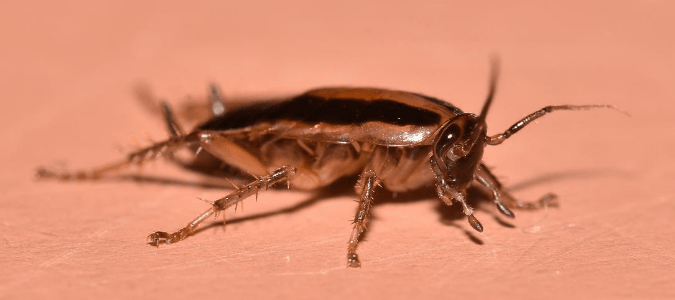You’re not alone if the sight of spiders sends shivers down your spine. These creepy crawlers are one of the most common household pests, and their presence can be a source of frustration and fear for many homeowners. Fortunately, there are several effective ways to keep spiders at bay, and it all starts with understanding what they hate the most.
Spiders have a few dislikes that can be used to our advantage when it comes to spider control. By taking advantage of these dislikes, you can create a home that is inhospitable to spiders, keeping them from infesting your living spaces and invading your peace of mind.
Key Takeaways
- Understanding what spiders hate can help you keep them out of your home.
- Spiders have a few key dislikes, including certain scents, lighting, and movements.
- By utilizing these dislikes, you can create a home that is unattractive to spiders and minimize the risk of spider infestations.
Understanding Arachnophobia: Fear of Spiders Explained
Do you dread coming across a spider in your home? Does the mere thought of a spider send shivers down your spine? You’re not alone. Arachnophobia, or the fear of spiders, affects millions of people worldwide.
Despite the fact that most spiders are harmless and even beneficial in controlling other pest populations, their creepy appearance, quick movements, and venomous potential trigger intense fear in many people.
Interestingly, studies suggest that arachnophobia may have an evolutionary basis. Our ancestors who were more avoidant of spiders may have had a greater chance of survival by avoiding potentially venomous spiders.
However, it’s important to note that arachnophobia can be overcome through exposure therapy and other cognitive-behavioral techniques, allowing individuals to overcome their fear and coexist with spiders peacefully.
Now that you know some spider facts and why arachnophobia exists, let’s explore practical methods for keeping spiders out of your home.
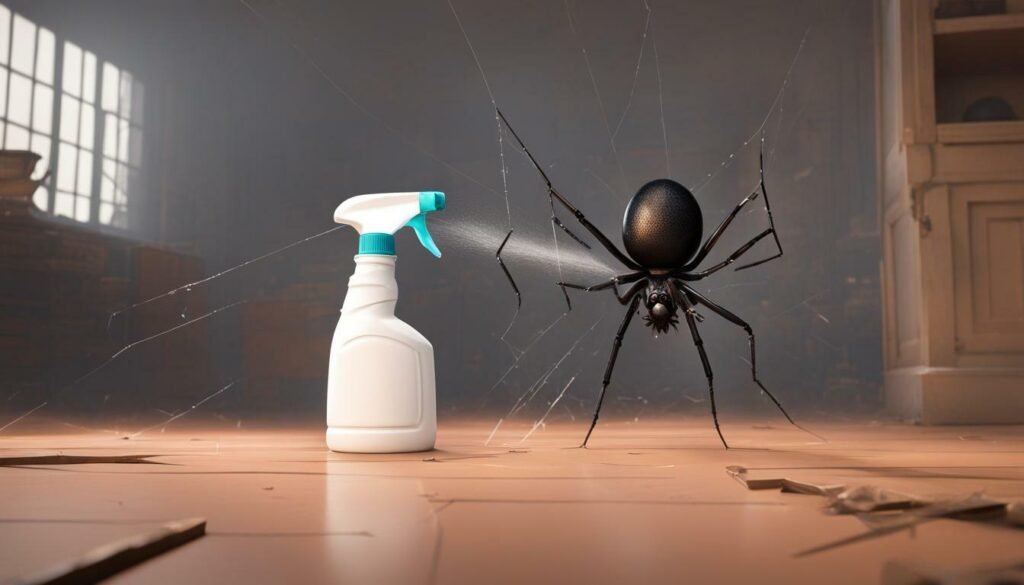

Natural Spider Deterrents: What Works and Why
Spiders are fascinating creatures, but if you’re like most people, you probably don’t want them invading your home. Fortunately, there are natural spider repellents that can help keep spiders away without resorting to harmful chemicals. Here are some methods that work and why:
Citrus Peels
Spiders hate the smell of citrus, making it an effective natural spider repellent. Save orange, lemon, or lime peels and rub them along baseboards, windowsills, and other potential entry points to keep spiders from coming indoors. You can also boil citrus peels in water and use the resulting spray in spider-prone areas.
Vinegar
Vinegar has a strong odor that spiders dislike, making it an effective natural spider deterrent. Mix equal parts of white vinegar and water in a spray bottle and apply it to areas where spiders are likely to hide, such as corners, cracks, and crevices. Be careful not to use vinegar on porous surfaces, as it may cause damage.
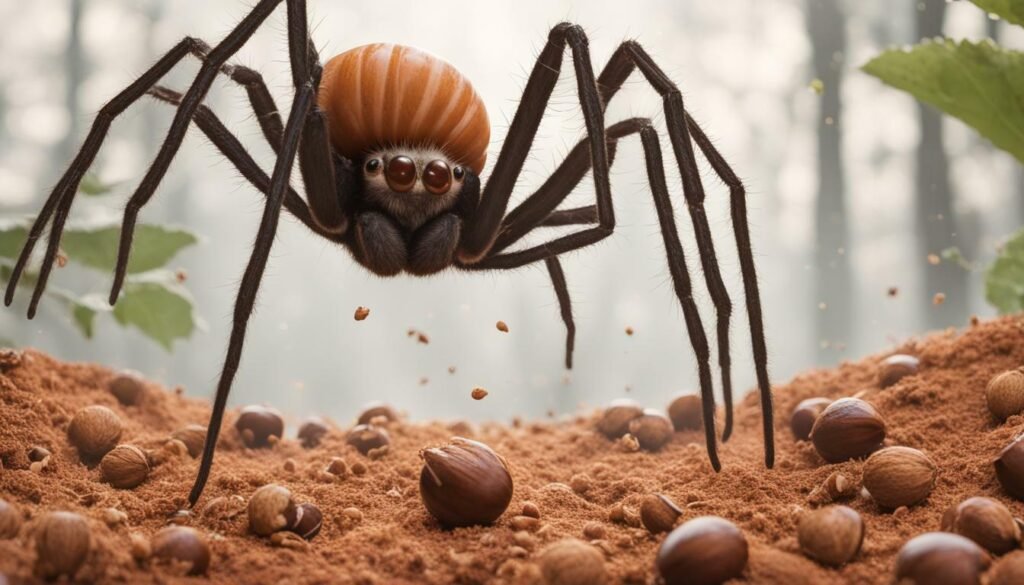  |
Natural spider deterrents can help keep your home spider-free without harmful chemicals. |
|---|
Peppermint Oil
Spiders dislike the smell of peppermint oil, making it another effective natural spider repellent. Mix a few drops of peppermint oil with water in a spray bottle and apply it to spider-prone areas. You can also soak cotton balls in peppermint oil and place them in corners and other areas where spiders are likely to hide.
Cedar
Cedar is a natural spider deterrent that can help keep spiders away from your home. Place cedar chips or sachets in closets, drawers, and other areas where spiders are likely to hide. You can also use cedar essential oil in a diffuser or mix it with water in a spray bottle and apply it to spider-prone areas.
These natural spider deterrents can help keep your home spider-free without resorting to harmful chemicals. Try them out and see which methods work best for you!
Cleaning and Decluttering: Keeping Spiders at Bay
Keeping your home clean and clutter-free is an effective way to prevent spiders from taking up residence. Spiders love dark, dusty, and cluttered areas, so regular cleaning can deter them from settling in your home.
Start by decluttering your home, getting rid of items you don’t need, and storing the rest in well-organized containers. This will minimize the number of hiding places spiders can find and make it easier to spot any potential infestations. Next, vacuum your home regularly, paying attention to corners, ceilings, and other hard-to-reach areas.
Remember to remove any spider webs you find during your cleaning routine. Spiders use webs to catch their prey and can quickly rebuild them if they are removed. Use a vacuum or a broom to remove the webs, being careful not to touch them with your hands.
Finally, pay attention to your outdoor surroundings. Spiders can enter your home through gaps and cracks in doors, windows, and walls. Seal any cracks and gaps you find to prevent spiders from entering your home. Keeping a clean and clutter-free home will help you keep spiders at bay and create a relaxing, spider-free environment.


Lighting Strategies: Illuminating Spider-Free Zones
Did you know that spiders prefer dark and dimly lit areas? By strategically illuminating your home, you can create spider-free zones that are unappealing to these creepy crawlers.
Firstly, consider using LED lights instead of traditional incandescent bulbs. LED lights emit significantly less heat, which attracts fewer insects that spiders typically feed on.
Secondly, avoid leaving any outdoor lights on all night long. These lights can attract insects, which in turn attract spiders. Instead, use motion-activated lights that only turn on when motion is detected.
Thirdly, install lighting fixtures that are difficult for spiders to crawl on, such as smooth glass or plastic materials. Spiders have a hard time crawling on these surfaces, which makes them less likely to hang out in those areas.
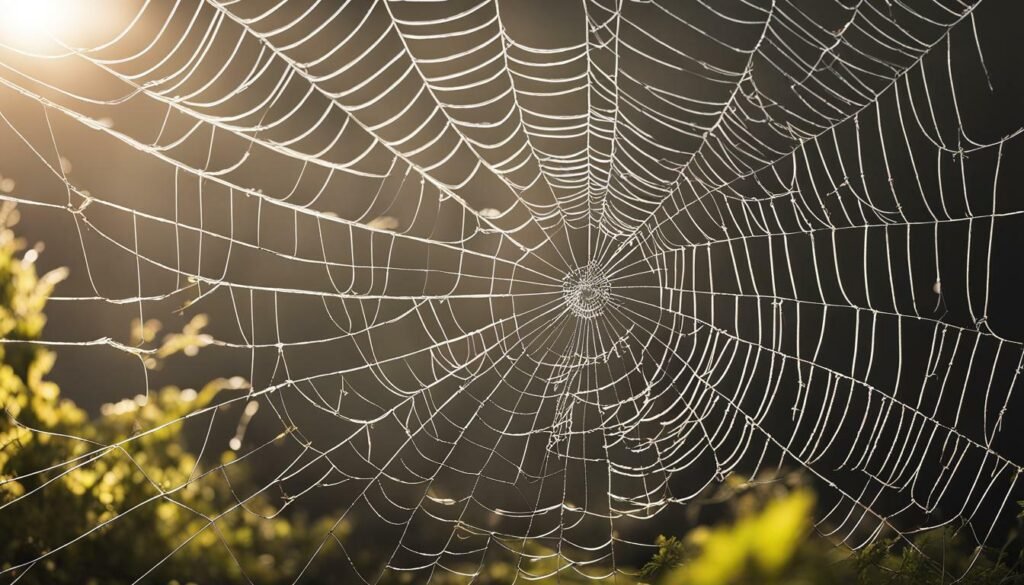

Finally, try using yellow bulbs in outdoor fixtures. Yellow light is less attractive to insects, which means fewer spiders will be attracted to the area.
By using these lighting strategies, you can effectively deter spiders from invading your home and create spider-free zones that you can enjoy without fear.
Plant-Based Spider Repellents: Natural Solutions for Your Home
If you’re looking for a natural way to keep spiders at bay, you may want to consider using plant-based spider repellents. Not only are they effective in deterring spiders, but they’re also safe for both you and the environment.
One of the most popular plant-based spider repellents is peppermint oil. Spiders are repelled by the strong scent of peppermint oil and will avoid areas where it’s present. Simply mix a few drops of peppermint oil with water in a spray bottle and apply it to areas where spiders may be entering, such as windows and doors.


Another effective plant-based spider repellent is eucalyptus oil. Like peppermint oil, spiders dislike the scent of eucalyptus and will stay away from areas where it’s applied. Mix a few drops of eucalyptus oil with water in a spray bottle and use it to spray areas where spiders may be lurking.
Lavender is also known to repel spiders due to its strong fragrance. You can make your own lavender spider repellent by tying a few stalks of fresh lavender together and hanging them in areas where spiders may be present.
Citronella oil is another great option for keeping spiders away. Not only does it repel spiders, but it also repels other insects like mosquitoes and flies. Mix a few drops of citronella oil with water in a spray bottle and use it to spray areas where spiders may be entering.
By using these plant-based spider repellents, you can create a safe and spider-free environment in your home without using harmful chemicals or pesticides.
Natural Spider Deterrents: What Works and Why
Are you tired of constantly dealing with spider infestations in your home? Take control of the situation by using natural spider deterrents.
Peppermint oil: The scent of peppermint oil is known to repel spiders. Simply mix a few drops of peppermint oil with water and spray it around your home to keep spiders at bay.
Citrus peels: Spiders dislike the smell of citrus fruits, so placing peels from oranges, lemons, or grapefruits around your home can help deter them.
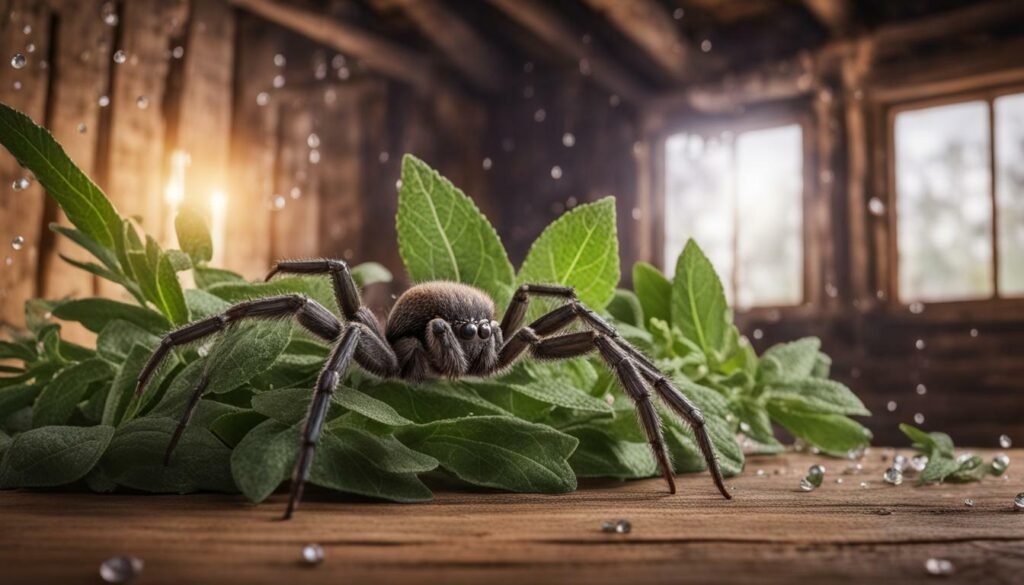

Vinegar: The strong smell of vinegar can repel spiders and also help to clean surfaces in your home. Mix equal parts water and vinegar and spray it in areas where spiders are commonly found.
Chestnuts: Did you know that spiders hate chestnuts? Place a few chestnuts in the corners of rooms where spiders are commonly found to deter them from entering.
By using natural spider deterrents, you can keep your home spider-free without the use of harmful chemicals. Give these methods a try and see the difference they make in your home.
Spider-Proofing Your Home: Sealing Entry Points
To prevent spiders from entering your home, you need to identify and seal their entry points. Start by inspecting your doors and windows and ensuring that they have proper seals. Check for any gaps or holes in the screens or frames and repair them immediately. Spiders can squeeze through the tiniest of gaps, so it’s essential to be thorough.
Another common entry point for spiders is through cracks in your walls or foundation. Inspect the exterior of your home and look for any cracks or gaps that could allow spiders to enter. Seal any holes or gaps using caulk or foam insulation. For larger openings, consider using wire mesh or hardware cloth.
Don’t forget to check for gaps around your plumbing and electrical fixtures. Seal any gaps or holes using silicone or expanding foam insulation. Keep in mind that spiders can also enter your home through vents, so make sure they have proper covers.
| Tip: | Use a flashlight to inspect dark corners and crevices, as spiders love to hide in these areas. |
|---|
By sealing your home’s entry points, you can significantly reduce the likelihood of spider infestations. Remember to regularly check for any new gaps or openings and promptly seal them to maintain a spider-free home.
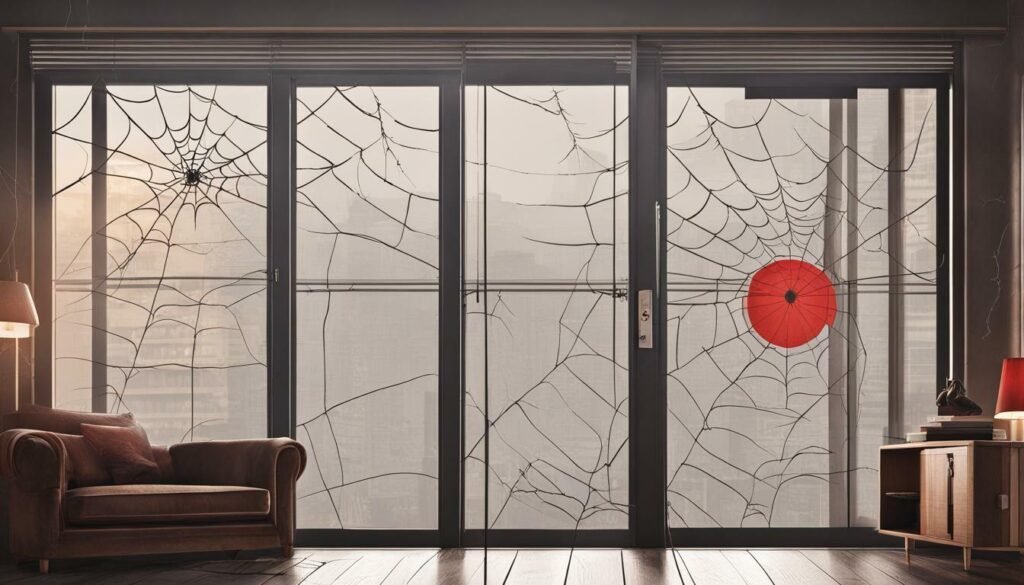

Outdoor Spider Control: Creating a Web-Free Yard
Spiders love to build webs outdoors, turning your serene garden into a spider haven. If you want to keep spiders at bay and enjoy your outdoor space, you need to take control of the situation. Here are some tips for creating a web-free yard:
- Regularly trim shrubs and bushes around your yard to eliminate hiding spots for spiders.
- Keep your grass short to prevent webs from forming.
- Remove any debris scattered around your yard, such as piles of leaves or sticks, as they create ideal homes for spiders.
- Seal gaps and cracks in your outdoor structures, such as sheds, playhouses, or gazebos, to prevent spiders from sneaking in.
Remember, prevention is key to keeping your yard free from spider infestations. Once you have eradicated existing spider webs, ensure you maintain a clean and clutter-free outdoor space to deter future infestations.
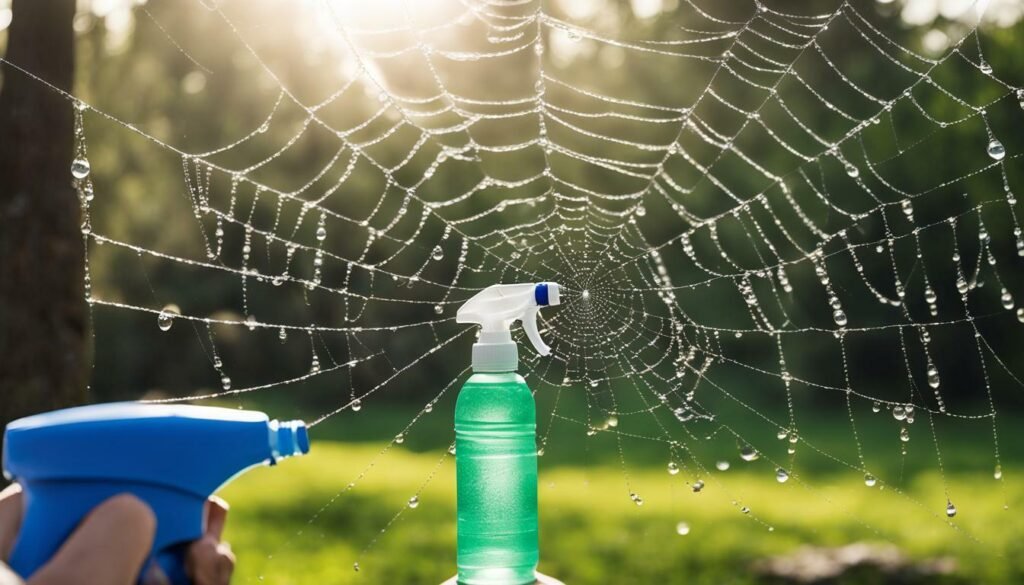

When All Else Fails: Effective Spider Pest Control
Despite your best efforts, sometimes spider infestations can get out of hand. When this happens, it may be time to bring in professional spider pest control services to help eliminate the problem.
Professional spider exterminators are trained to identify the type of spiders in your home and use targeted treatments to eliminate them safely and effectively. They have access to specialized tools and products that are not available to consumers, making their methods more potent in severe infestations.
Spider pest control services typically involve a thorough inspection of your home to identify the source of the infestation and determine the best course of action. Depending on the severity of the problem, the exterminator may use a combination of treatments, including sprays, dusts, and baits, to eliminate the spiders and prevent them from returning.
It’s important to note that professional spider pest control can be costly, so it should only be used as a last resort. However, if you have a severe spider infestation that cannot be managed through DIY methods, it’s worth considering professional help to ensure the safety and comfort of your home.
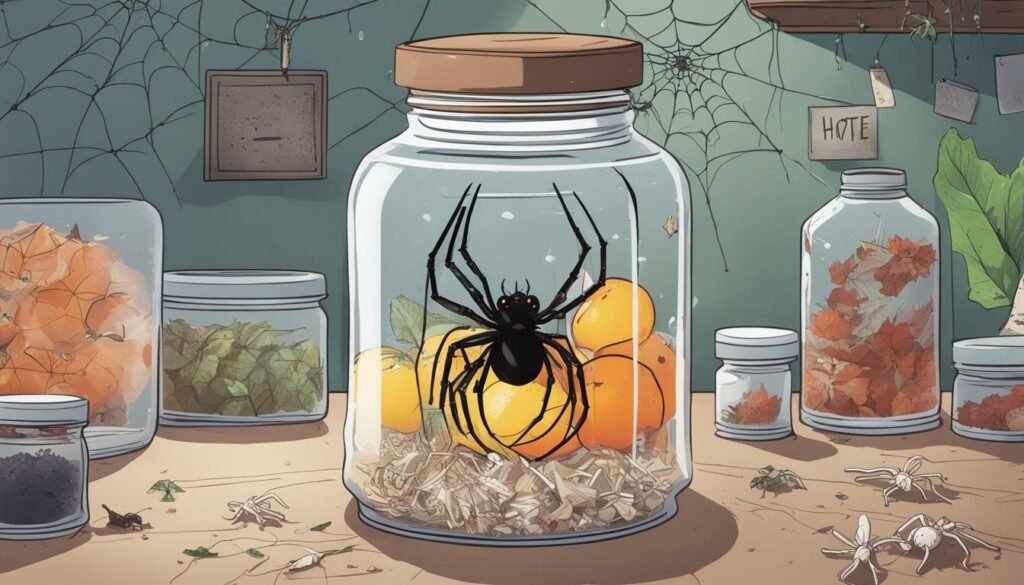

In conclusion, spider control and prevention are essential for maintaining a spider-free home. By using natural deterrents, cleaning and decluttering regularly, sealing entry points, and hiring professional pest control help when necessary, you can effectively keep spiders at bay and enjoy a comfortable and safe living space.
Conclusion
Congratulations! You’ve taken important steps towards keeping spiders at bay in your home and outdoor spaces. By incorporating natural spider deterrents, decluttering and cleaning regularly, sealing entry points, and investing in professional spider pest control when necessary, you’re well on your way to enjoying a spider-free sanctuary.
Remember, prevention is key when it comes to spider control, so be sure to implement these tips consistently to maintain a spider-free environment. Don’t let arachnophobia hold you back from living your best life. With the right strategies in place, you can say goodbye to those eight-legged creatures once and for all.
FAQ
Q: What do spiders hate the most?
A: Spiders dislike certain scents and substances such as peppermint oil, vinegar, and citrus. Using these as natural deterrents can help in keeping spiders away.
Q: What is arachnophobia?
A: Arachnophobia is the fear of spiders. It is a common phobia that affects many people and can cause extreme anxiety or panic when encountering spiders.
Q: How can I naturally repel spiders?
A: There are several natural spider deterrents that you can use, such as peppermint oil, vinegar, chestnuts, and citrus peels. These scents are known to repel spiders.
Q: How can cleaning and decluttering help prevent spiders?
A: Spiders are attracted to cluttered and messy areas where they can find hiding spots. Keeping your home clean and decluttered makes it less inviting for spiders.
Q: Are there lighting strategies that can deter spiders?
A: Yes, spiders prefer dark and dimly lit areas. Using bright lights and keeping your home well-illuminated can help create spider-free zones.
Q: How can I use plant-based spider repellents?
A: Plant-based spider repellents, such as lavender or eucalyptus, can be used in the form of essential oils or by planting these herbs near windows and entryways to deter spiders.
Q: Which essential oils can repel spiders?
A: Essential oils like peppermint, tea tree, and citrus oils are known to repel spiders. Dilute these oils with water and spray them in areas where spiders are likely to be found.
Q: How can I seal entry points to spider-proof my home?
A: Look for cracks, gaps, and openings around windows, doors, and vents. Seal them with caulk or weatherstripping to prevent spiders from entering your home.
Q: How can I keep my yard free from spiders?
A: To prevent spiders from taking over outdoor spaces, keep your yard well-maintained, remove debris, and trim vegetation away from the house. Regularly clean and inspect outdoor furniture and play structures.
Q: What should I do if DIY methods don’t work?
A: If you have a severe spider infestation that cannot be managed through DIY methods, it is recommended to seek professional spider pest control services. They have the expertise and tools to effectively eliminate spiders from your home.
Your Expert in Animal Control and Extermination. Trust our experience for humane, effective pest management, protecting your property and ensuring peace of mind with Michael S.





